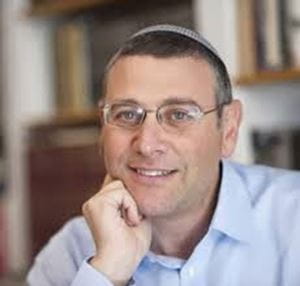
One of Jerusalem’s top Bible scholars explores the prophet Jeremiah. How would a prophet relate to today’s world?
(Excerpted from “Jeremiah: The Fate of a Prophet” by Binyamin Lau, with permission from Maggid Books, a division of Koren Publishers Jerusalem. See www.korenpub.com)
The Status of the Prophet within Society:
“Fool is the Prophet, Mad is the Man of Letters”
In terms of today’s social milieu, the prophet might be regarded as something of a public intellectual, a man of letters. An eternal critic, an outsider to the system, a gadfly who must summon all his literary or oratory powers to persuade his audience of the truth of his words – and of the mortal danger of ignoring them. A prophecy does not depend upon its being heard. On the contrary, more often than not it is disregarded, though the speaker’s own belief in it does not allow him to remain silent.² How does society relate to one who determinedly, doggedly repeats his unheeded words? Practical men, when faced with adversity, will often state, unfazed, “The dogs may bark, but the caravan moves on.” But while this might encourage the caravan on its way, what will be of the dogs? How does one shake the people of their complacency and alert them to the danger that is looming?
Throughout biblical history, prophets have repeatedly failed to penetrate the collective consciousness. Moses, the greatest of the prophets; Elijah and Elisha, the oratory prophets; Isaiah, Jeremiah, Ezekiel, and the other twelve literary prophets – none were successful in getting their message across and inspiring the people to repentance. Jonah is perhaps the only prophet who may be said to have fulfilled his mission, making the people of Nineveh see the error of their ways.
The words of the prophets have been preserved for us, their distant descendants, so that we may learn what is right in the eyes of God and man. But in their own days, in real time, there is hardly a prophet who has redressed the social, religious, or political wrongs of Israel; the prophets barked, but the caravan kept moving. Moreover, when a prophet dared to deviate from his usual message of morality and challenged the existing order, he was declared an enemy of the people. Thus, the prophet Amos was banished by the priest of Bethel, Amaziah, in the name of King Jeroboam: “Get thee out, seer!” (Amos 7:12).
The comparison of the prophet to a public intellectual is intended not to diminish the importance of the former, but to emphasize the responsibility of the latter. While the significance of the prophetic overture “Thus said the Lord” may be disputed, and it is difficult to distinguish a true prophet from a false one, certain hallmarks of true prophecy may be found. First among these is the prophet’s readiness to pay a personal price for his vision; thus, the “prophet” who is eager to reinforce the dominant zeitgeist and the prevailing mores – who tells the people exactly what they want to hear – is immediately suspect. …
The strength of the prophet as public intellectual derives from his faith and his deference to the word of God. His intent is never to mollify the masses. Four hundred prophets forecasting in perfect unison do not a true prophecy make. Does society want to hear that other still, small voice? Generally not. Wherever the government, press, and tycoons form a controlling triad, any dissenting opinions will be quickly snuffed out. Worse, prophets are sometimes bought off by interested parties and, through the combined forces of money and media, forcibly mold public opinion. The voice of God should therefore be sought in those discordant voices that do not toe the party line. Of course, prophetic opposition is not necessarily right. Sometimes the ruling power finds itself torn between two opposing prophets, unable to declare a winner. Jeremiah himself faces such opposition, clashing with serious prophets who present their own systematic worldview, and it is wholly unclear which of them is the true messenger of God.
However, there is another criterion for a true prophet. He must love his people. Even when the harshest reproach is called for, the prophet must consider himself a divine emissary whose role is to help redeem the people, not to stand aloof and condemn. Indeed, journalists today take on the role of moral and social critics, though more often than not their criticism is laced with the venom of loathing. Criticism based on love, of the kind that distinguished Jeremiah, is not often found.
Why Jeremiah?
Some prophets were defrocked or harmed because of their prophecies. First and foremost among these few was Jeremiah. As a prophet, his life was endangered more than once. The inner truth that burned within him took him to such extremes that he eventually betrayed the Kingdom of Judah. Under siege, during an attempt to expel the enemy from the walls of Jerusalem, he called for his people to cross the battle lines and surrender. He thus became despised and disparaged in the streets of Jerusalem, a menace to the public good. All rejected him – kings, priests, noblemen, and the masses.
Three kings were subject to the prophecies of Jeremiah: Josiah, Jehoiakim, and Zedekiah. The first barely acknowledged him, possibly due to his tender age; the second sought to eliminate him in order to ensure the stability of his reign; the third actually believed him, but could
not overcome his own weakness and fears. The priests of the Temple regarded Jeremiah as one regards a gadfly – a pest and troublemaker. The Temple wardens restricted his every step. Among the noblemen there were different leanings; some pandered to the king, while most took a belligerent stance against the rising Babylonian Empire. For the latter, Jeremiah was a menace. And the masses? They behaved as masses do. At times they sought to kill the prophet; other times they needed him desperately, their loyalties changing with the wind. Among the people, Jeremiah’s most formidable opponents were the false prophets. They aroused the men of Zedekiah’s time to rebel against the Babylonians and encouraged the king to form a pro-Egyptian alliance with the surrounding nations. For Jeremiah, these false prophets were the true enemy.
About the Author:
Rabbi Dr. Binyamin Lau is an Israeli community leader, educator and social activist. He directs the Center for Judaism and Society at Beit Morasha of Jerusalem, and founded Beit Morasha’s Moshe Green Beit Midrash for Women. Rabbi Lau lectures on halakha and social justice at Beit Morasha’s Beren College, and serves as Rabbi of the Ramban Synagogue in Jerusalem. He studied at the Har Etzion and Kibbutz HaDati Yeshivas, and received a PhD in Talmud from Bar-Ilan University.
Jeremiah: The Fate of a Prophet (Maggid Books, 2013) is available from www.korenpub.com/EN , Amazon and all Jewish bookstores.

